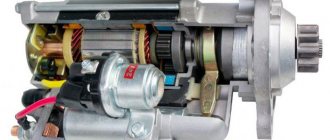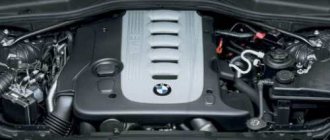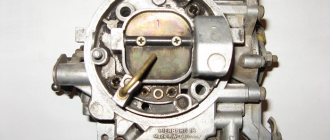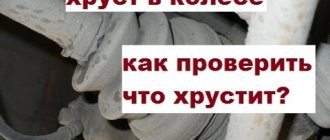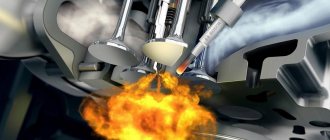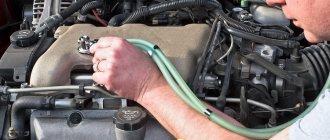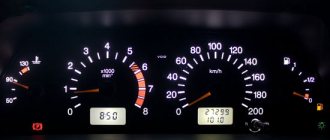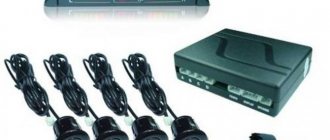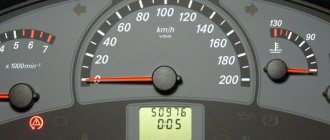Any extraneous sound that appears when the vehicle is moving may indicate a malfunction in its operation.
It is important to make a diagnosis as soon as possible to eliminate a dangerous situation, as well as correct the problem at an early stage.
One of these noises includes the sounds created in different parts of the car when turning. Let's look at the 5 most common ones.
Extraneous sound in power steering (main reasons)
There are several reasons why extraneous sounds occur in the hydraulic booster.
Here are some of them:
- Low hydraulic fluid level. Be sure to check the fluid level in the power steering; if the indicator is at the minimum level, you should add oil.
- The liquid does not correspond to the temperature conditions. If a sharp change in temperature is expected in the region, for example the onset of frost, it is worth replacing the liquid with one more suitable for winter.
- Poor quality oil. If there is a smell of burnt rubber in the cabin, you should check the hydraulic fluid for contamination. If, when checking the oil, the color of the liquid does not match the color when filling, this indicates that it urgently needs to be replaced. It is best to change the power steering fluid exactly according to the schedule established when the car was released.
- Airing the power steering system. Air entering a closed system is very dangerous. If foam forms on the surface when opening the reservoir, you should urgently bleed the power steering or replace the fluid.
- Damage to the steering rack. The main sign of a malfunction is a knocking sound from the front wheels or in the steering rack housing. The causes of damage can be different, most often it is wear of the gasket, malfunction of the tie rod boots. If there is the slightest problem with the steering rack, repairs are necessary.
- The power steering drive belt is loose or completely worn out. The lower the belt tension when the engine is running, the more it heats up. In such cases, the drive belt needs to be completely replaced, or the belt should be tensioned according to the manual.
Damage to the power steering pump part. The most complex and expensive breakdown in the power steering system. The causes of failure can be different, for example, faults in pump parts, such as bearings or seals.
Steering wheel grinding and squeaking
These sounds may indicate wear:
- steering system;
- front suspension;
- support bearings;
- lower ball joints.
For diagnostics, it is recommended to follow the steps described above; if any malfunction is detected, immediately eliminate it.
Grinding and squeaking can also indicate a lack of lubrication in these mechanisms. By adding it in moderation, you can eliminate unpleasant squeaks.
The hydraulic booster whistles, hums, vibrates when cold
- The main reason for a hydraulic unit whistling when cold is low-quality or recycled oil. This may be indicated by a strong hum when the power steering operates in winter. Old, recycled oil thickens at low temperatures and makes it harder for the system to pump.
- Air entering the pressure lines. Air leaks can cause severe damage to the entire power steering system, because unaccounted for oxygen changes the properties of the hydraulic fluid, causing the engine itself and all its parts to suffer.
- Poor flushing of the entire hydraulic system. After improper flushing of the system, an air bubble forms at the bottom of the liquid tank, which interferes with the normal operation of the hydraulic booster, resulting in extraneous noise.
- Hydraulic fluid contamination. Even the smallest specks of dust and remaining dirt in the tank can lead to damage not only to the hydraulic unit itself, but also to the steering rack and engine. Check carefully for dirt when changing oil.
- Hydraulic power steering bearing failure. With such a breakdown, the extraneous sound will be constant.
- Chemical elements and salts. In winter, roads are covered with special anti-ice compounds, which in turn corrode oil seals and anthers, which leads to hydraulic failure and the appearance of extraneous sounds during operation.
Shock absorber struts and/or support bearings
If the cause of the knocking lies in the shock absorbers or support bearings, then there will be knocking not only when turning the steering wheel to the right/left, but also when driving in a straight line. However, during sharp turns, especially at high speed, such a knock will be more pronounced, since additional loads will be applied to the shock absorbers and bearings.
In the latter case, the cause of the knock may be a broken shock absorber spring. This usually happens at its edges (top or bottom). Accordingly, when driving on uneven roads, as well as when the car rolls in turns, the driver may hear a metallic clanging sound. When turning left - right spring, when turning right - left spring.
You can check the shock absorbers and bearings by examining them for play. To do this, you need to dismantle the wheel and shake/twist the shock absorbers and bearings. In rare cases, the knocking noise may be caused by a loose fastening nut.
Extraneous sound when turning sharply
During sharp turns, when the wheels are turned all the way, the load on the hydraulic booster increases many times. As a result, extraneous sound may appear. Which is not necessarily the cause of the breakdown.
- For such subtle differences, you need to thoroughly study the manual when buying a car.
- Manufacturers describe all possible options there, including this one.
- Another reason for the sound when turning the wheels is the blocking of the fluid flow by the bypass valve.
At the same time, the pump begins to heat up. Which can cause serious damage. Do not keep the wheels turned to maximum for more than 5 seconds.
Crunching when cornering in front wheel drive cars
It also happens that the car crunches when entering a turn. Moreover, the sharper the turn and the higher the speed, the more characteristic and louder the crunching noise produced. It seems that this crunch does not depend on the turn of the steering wheel, but comes precisely during a turning maneuver on the road and is emitted from under the wheel that bears the load - that is, the wheel on the outside of the turning path. At the same time, the crunch most often occurs when turning only in a certain direction: to the right or to the left.
This crunch is typical only for front-wheel drive or all-wheel drive vehicles. And the cause of the crunching noise when turning the car is the CV joint, better known among common people as a “grenade”.
A CV joint is a connection that allows the front wheel to turn in all directions at a certain angle while maintaining a constant axle speed. Because the CV joint is constantly spinning and under severe stress, it sometimes wears out and must be replaced.
Hydraulic noise after fluid change
After replacement, an extraneous sound occurs in the pump part due to the change of power steering fluid. Friction increases between the inside of the stator ring and the rotor plates. Vibration of the plates appears.
To avoid this, you should select hydraulic fluid according to the recommendations in the manual.
Tips for good power steering performance
By following simple rules, it is very easy to increase the service life of the hydraulic steering system.
- Timely check of the hydraulic fluid level;
- Oil change exactly on schedule;
- Fix the wheels in a level position;
- If there is a problem with the hydraulic system, correct the problem immediately;
- Periodically inspect the steering rack for damage and malfunctions;
- Choose high-quality power steering fluid.
Do not make sharp turns with the wheels turned out, or fix this position for no more than 5 seconds.
By strictly following all the rules for the safe operation of a hydraulic installation, you can maintain its functionality for a long time and save a lot on expensive repairs.
